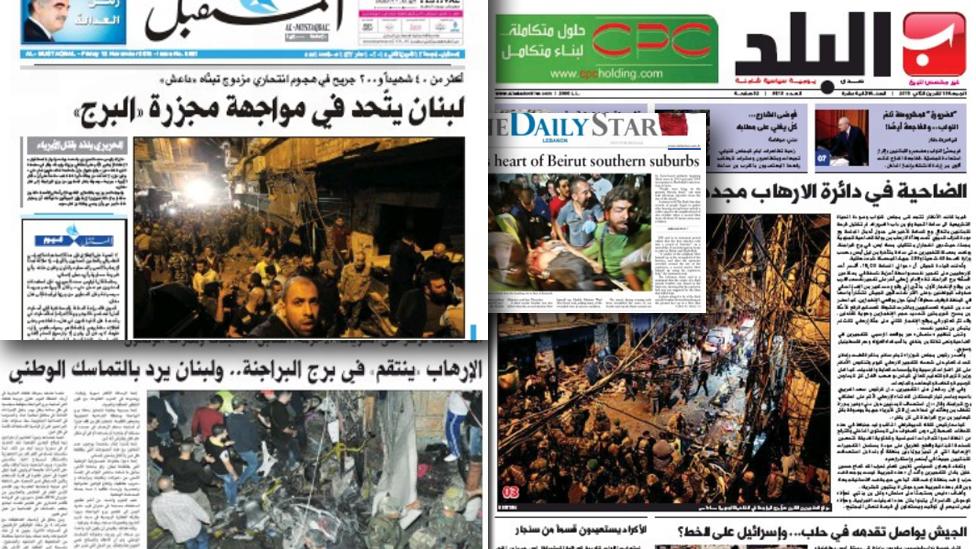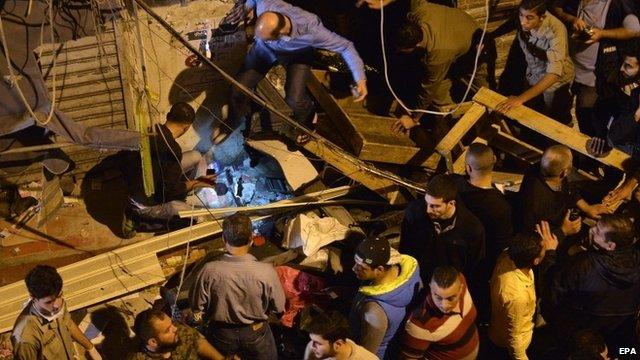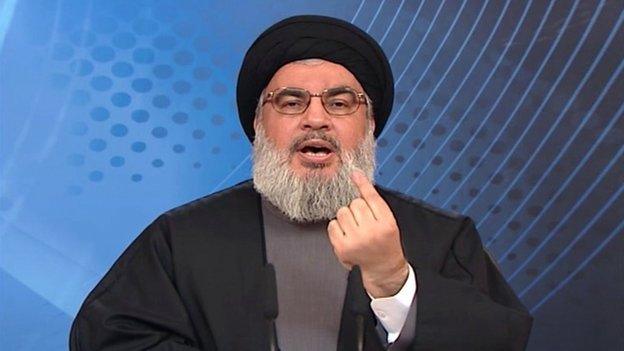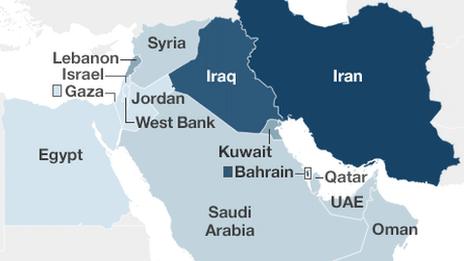Lebanese media denounce Beirut blasts
- Published

Lebanese newspapers said the bombings had been triggered by the Syrian war
The media in Lebanon have condemned the deadly suicide attacks that hit the country's capital on Thursday, saying they were triggered by the war in Syria.
In newspapers, commentators also call for unity and say the fight against the Islamic State (IS) militant group must go on.
At least 41 people were killed when the two suicide bombings occurred in Beirut late on Thursday. More than 200 people were wounded.
IS has claimed responsibility for the two bombings in the suburb of Burj al-Barajneh, a stronghold of the Hezbollah group that supports Syria's government.
Calls for unity
Lebanese commentators denounce the attack as a "massacre" and "blind terrorism", with some lashing out at Turkey, Saudi Arabia and Qatar for allegedly supporting jihadist groups in Syria.
Rival Lebanese parties used their affiliated media outlets to reiterate calls for unity in fighting IS.
Al-Mustaqbal, external, a newspaper owned by the predominantly Sunni, and Western-backed, Future Movement, says the blasts targeted "all Lebanese regardless of religion or politics," and urges "consolidation of civil peace and unity" in response to the attack.
Al-Safir, external, which supports Syria's President Bashar al-Assad, urges all forces to "discard hatred and private interests in dealing with this national disaster".
A separate article in Al-Safir says the attacks send "a very clear message" to Russians, Syrians, Lebanese, Iraqis and Iranians who fight Islamic State. It also criticises Turkey, Saudi Arabia and Qatar for allegedly backing jihadists.
Pro-Hezbollah daily Al-Akhbar, external says the attacks mean that the fight against Islamic State in Syria must continue in order to protect Lebanon.
Lebanese centrist newspaper Al-Anwar, external says that this "terrible massacre will not force Hezbollah or Russia out of Syria". "We must control our reactions and emotions, and not fall into miscalculation," it adds.
Lebanese commentators also argue that the bombings seek to increase tensions between mainly Sunni Palestinians and Shia-dominated Lebanese.
Reports that the perpetrators were Palestinian and Syrian fan this discord, says pro-Hezbollah website Al-Hadath News, external.
One Twitter user, @LeilZahra, external, says nationalities were "irrelevant to the crime".
Social media critical of Hezbollah
Many of the social media conversations also criticise Hezbollah.
Prominent Lebanese Twitter user @jerrymahers, external accuses the group of hypocrisy, saying it condemned the bombings while "killing the Syrian people".
Many comments condemn Hezbollah's support for Mr Assad. User @pury66_a, external tweeted an image of a man standing amid rubble cradling an apparently dead child. The user suggests that the Beirut attacks came in revenge for the deaths of "500,000 Syrian martyrs in whose killing Hezbollah participated".
And Iranian media reiterate official statements which point the finger of blame at Sunni extremists and Israel.
BBC Monitoring reports and analyses news from TV, radio, web and print media around the world. You can follow BBC Monitoring on Twitter, external and Facebook, external.
- Published13 November 2015

- Published6 May 2015

- Published19 December 2013
